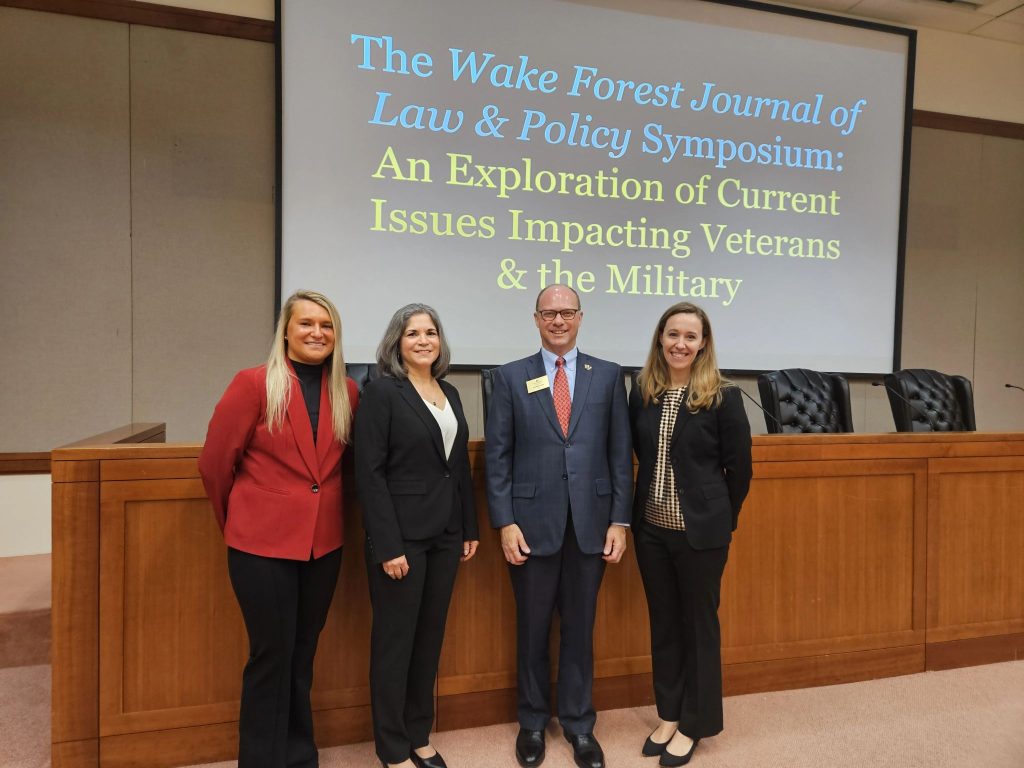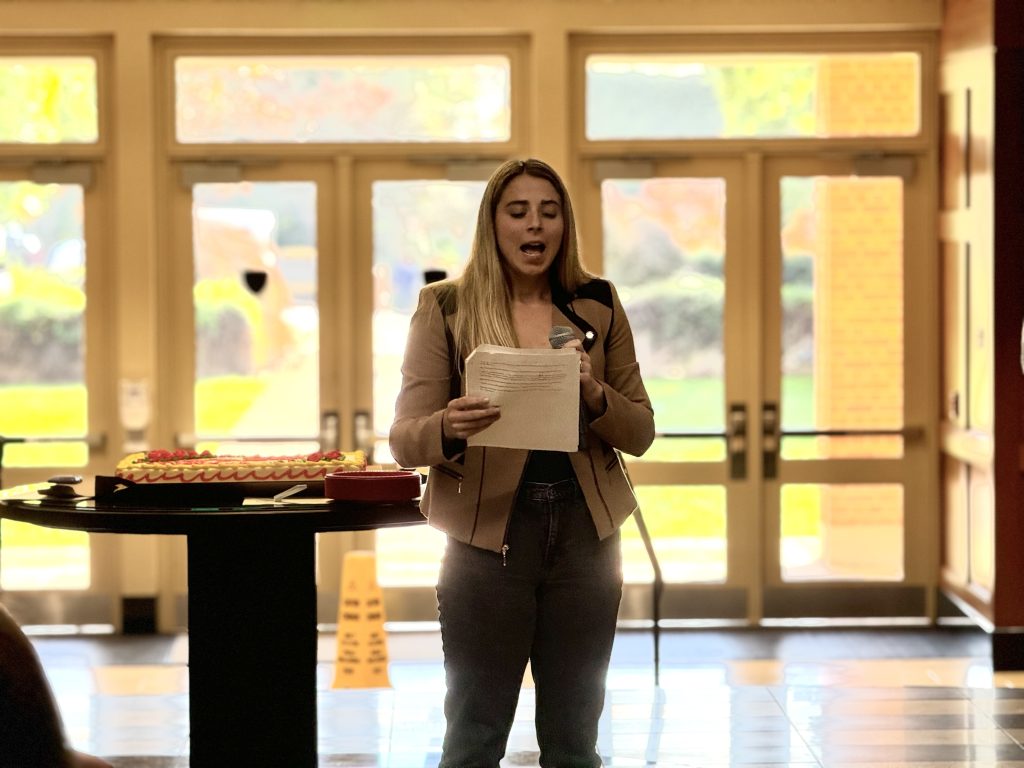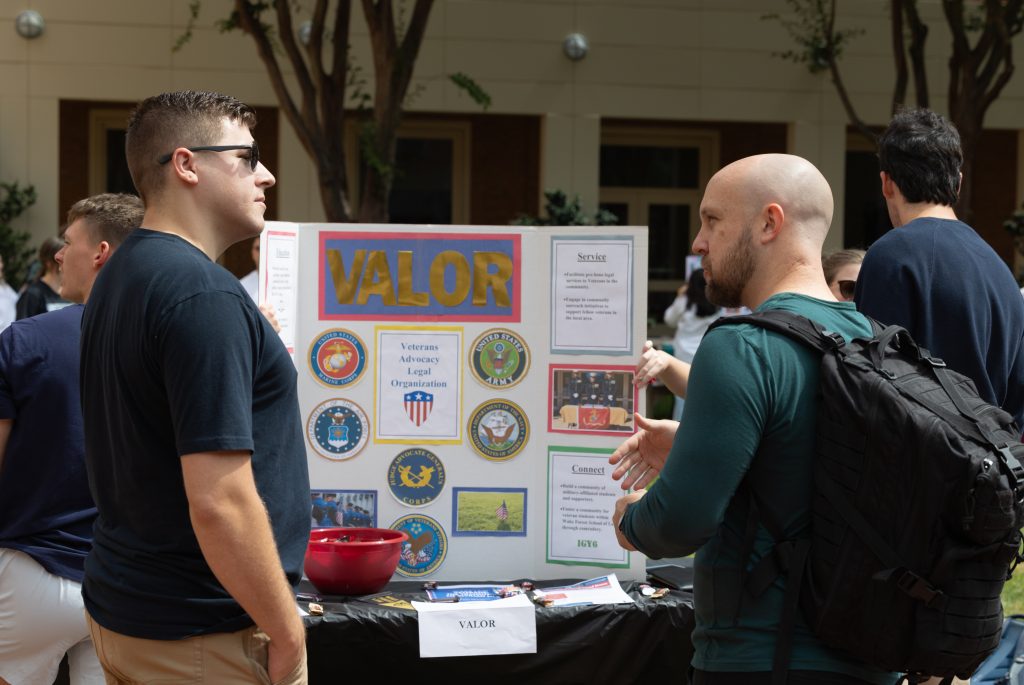Stronger Together: The Veteran and Active Duty Community at Wake Forest Law
At Wake Forest Law, veterans and active duty service-member students don’t just find a top-tier legal education—they find a community. Through the Veterans Legal Clinic, the Yellow Ribbon Program, Veterans Advocacy Legal Organization (VALOR), and dedicated faculty and staff, the Law School is committed to supporting those who have served and continue to serve.
But it’s the students who truly bring this community to life.
For many military-affiliated students, service doesn’t stop when they leave the armed forces—it simply takes a new form. As Marine Nick Rader (JD ’25) put it, “I joined the military to give something back to this country that has given so much to me.” That sense of duty carries forward through initiatives like the Veterans Legal Clinic, where students continue their commitment to helping others while preparing for careers in the law.
The Veterans Legal Clinic provides free legal representation to former service members, many of whom face significant challenges such as mental health struggles, racial discrimination, and limited access to health care. Clinic students assist veterans in correcting injustices in their military records and advocating on their behalf before the Department of Veterans Affairs.

The clinic is led by Assistant Clinical Professor Eleanor Morales (JD ’10), a United States Army Reserve Officer. After earning her bachelor of arts degree from Davidson College and her law degree from Wake Forest Law, Professor Morales joined the Army Judge Advocate General (JAG) Corps, where she served on active duty for five years before transitioning to the Reserves where she currently serves in the rank of Lieutenant Colonel.
As a Wake Forest Law alumna, a reserve officer, and a dedicated advocate for veterans, Professor Morales is uniquely positioned to lead the Veterans Legal Clinic.
The clinic is composed of law students who are on active duty, veterans, military-affiliated, or simply interested in helping veterans, and it offers an opportunity for students to gain hands-on legal experience while serving real clients.
Recently, the clinic secured a fully honorable discharge for a female service member who is a survivor of military sexual trauma (MST). The clinic also won veteran status for a Vietnam-era soldier whose unfair discharge was a result of a lack of understanding around the effects of mental health diagnoses.
Their work not only makes a difference in the lives of veterans, but also prepares them for their careers in law, and for some, a career as an attorney in the military.

For students like Brittany Taylor (JD ’25), an active duty combat arms officer in the United States Army, these opportunities are more than just programs—they are a pathway to success in the legal field.
“The Veterans Legal Clinic has taught me not only to be a better attorney, but has better prepared me for my career as a JAG,” says Brittany, who is currently participating in the Army’s Funded Legal Education Program (FLEP), which helps cover law school tuition while service members continue to serve on active duty.
For some, the opportunity to work in the Veterans Legal Clinic factored into their decision to choose Wake Forest Law for their legal education.
“The Law School has drawn increasing numbers of veterans in recent years due to its policies and Veterans Legal Clinic, and we have a wide variety of former servicemen and women in the student body today,” says Hiram Poplin (JD ’25), who was a first lieutenant in the United States army as an infantry officer.
Wake Forest Law currently has 13 active duty and former service members enrolled, a number that is expected to grow, especially as more people take advantage of the Yellow Ribbon Program.
The Yellow Ribbon Program, launched in 2008, helps bridge the gap in tuition costs for eligible veterans, service members, and their families—making law school more accessible for military-affiliated students. Wake Forest Law, a longtime participant in the program, increased its match benefit to unlimited in Fall 2024 and imposes no cap on the number of students who can participate.
Hiram, who serves as the VALOR president, is one such participant.
“I know that I personally would not have been able to attend law school without Wake’s generous financial matching of my GI Bill benefits through the Yellow Ribbon Program—and for that financial aid, I will forever be grateful,” says Hiram.
In addition to the Veterans Legal Clinic and student financial support, Wake Forest Law encourages service and camaraderie through VALOR.

VALOR, founded by veterans at Wake Forest Law, serves as a hub for military-affiliated or military-interested students to connect, support one another, and engage in local outreach efforts for veterans. In addition to organizing events, such as the Veterans Day Ceremony and Marine Corps Birthday Celebration and the Night For Vets at a Winston-Salem Dash baseball game, the organization hosts a service project twice a year. They also educate others about opportunities for service members, military law, and veteran issues.
“The VALOR students do a great job of participating in service-oriented events, organizing information sessions for law students seeking employment opportunities as a military lawyer, and including the whole student body in social events,” says Professor Morales, who has served as the faculty advisor for VALOR for the last several years. “They are a very active student organization, and interest in joining VALOR continues to grow.”
For many military-affiliated students, the transition to law school can be challenging. However, VALOR, the Veterans Legal Clinic, and the Wake Forest Law faculty and staff provide support, encourage community, and help ease the transition.
For Josh Flemings (JD ’26), a veteran who spent nearly a decade away from academia before attending law school, Wake Forest Law’s close-knit community and accessible faculty made all the difference.
“Because I had been out of academia for nine years and was a returning student, I wanted to go to a school with smaller class sizes and easy access to professors. Every professor I have had is incredibly accessible and more than willing to spend time going over concepts with students,” says Josh.
But it’s the sense of community the students continue to come back to.
Justin Combs (JD ’25), a Marine, found that connecting with other veterans helped him regain a sense of camaraderie he missed after leaving active duty.
“I didn’t realize how much I would miss the camaraderie of service until I left the Marine Corps,” says Justin. “Wake Forest Law and the VALOR did a fantastic job of connecting me to other veterans and giving me a supportive community.”
Former Army Military Intelligence Officer Will Scott (JD ’26), who currently serves as a law school admissions coach for Service to School (S2S)—a nonprofit dedicated to supporting active duty service members applying to graduate school—echoes this sentiment.
“Transitioning from military life is at times difficult because the military has a very singular purpose while people attend law school for a wide variety of reasons,” says Will. “However, the military excels at encouraging camaraderie, and I’ve used skills I picked up in the Army to find my tribe in law school.”
“I was pleasantly surprised by the robust veteran community here,” says Chris Whipple (JD ’26), a captain in the United States Army Reserves. “It’s nice having people with similar backgrounds and experiences to understand where I am coming from.”
Through shared experiences and a commitment to supporting one another, these students don’t just find a community—they build it.
And that impact extends far beyond law school. Whether they go on to serve as JAG officers, advocate for veterans’ rights, or pursue careers in private practice, these students carry forward a legacy of service, leadership, and excellence—just as they always have.
Categories: News, Our People